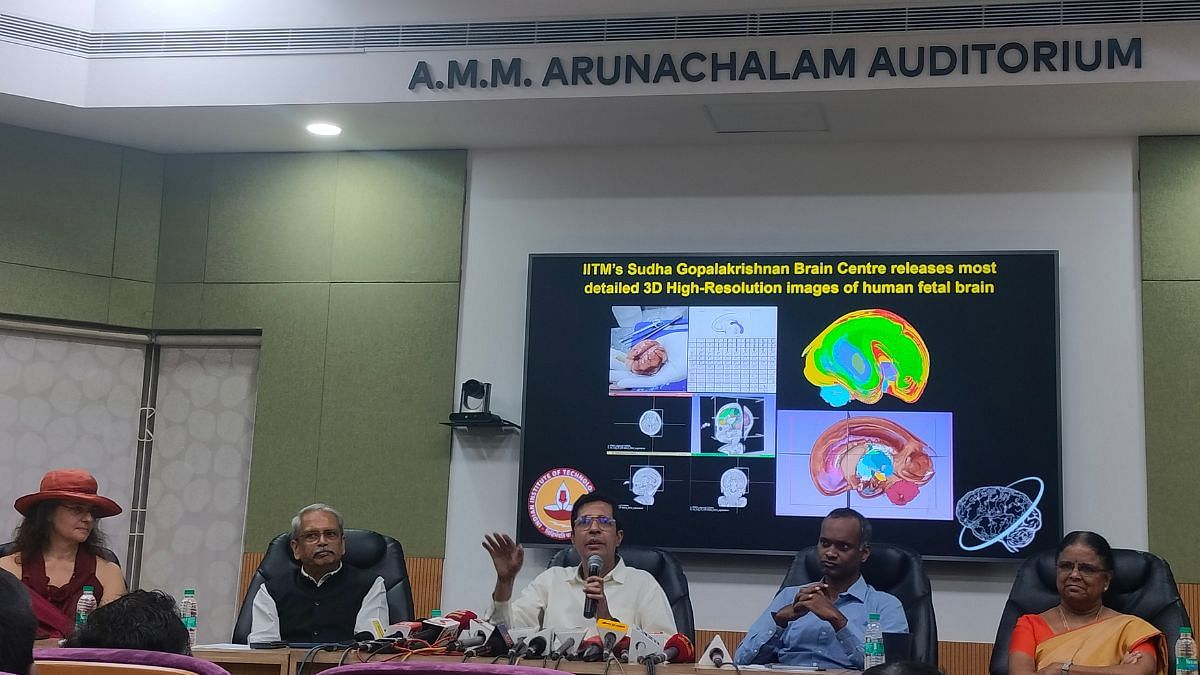Chennai: IIT Madras has developed the most detailed, three-dimensional high-resolution images of the foetal brain—a significant landmark in visualising the human brain, its functions and deformities.
Named DHARANI, the data set contains 5,132 brain sections captured digitally using brain mapping technology at the Sudha Gopalakrishnan Brain Centre in the IIT Madras campus. The research team has also developed a detailed 3D atlas of the brain, marking over 500 regions with cellular resolutions.
The work is expected to help scientists understand brain development from the foetal stage to adulthood, besides understanding the causes of developmental disorders such as autism and cerebral palsy.
The data set is available to the public for free.
“We have also mapped the regions in the brain, where we can decipher and see how it develops,” Professor Mohanasankar Sivaprakasam, head of the Sudha Gopalakrishnan Brain Centre, said at a press conference in Chennai Tuesday.
The brain centre was launched at IIT Madras in 2022 to boost multidisciplinary efforts in science, technology, computing and medicine.
“It’s the first step of a big journey. When we understand and study the brain, we will be able to understand its future deformities,” Professor V. Kamakoti, director of IIT Madras, said at the press conference.
He explained that the study faced multiple challenges, including those posed by the pandemic due to the unavailability of equipment to conduct such a study.
“So we developed the equipment indigenously,” he said, adding that IIT Madras used a fund of US$15 million for the initiative, which is less than one-tenth the cost spent on similar studies in Western countries. They did so because they wanted to limit the expenses.
The project was supported by the office of the principal scientific advisor to the government of India; IIT Madras alumnus and co-founder of Infosys Kris Gopalakrishnan; Premji Invest; Fortis Healthcare and Agilus Diagnostic.
Congratulating the team on its success, Gopalakrishnan said the accomplishment reconfirms that India can achieve world-class milestones in science and technology.
“World-class research can be done here in India. We need to have confidence. We must play an important role in scientific research and developing products that the entire world would use,” he said at the press conference.
Also Read: 2024 Physics Nobel for AI scientists. How they pioneered machine learning modelled on human brain
Study will motivate researchers to develop frontier AI
As part of the study, which started during the COVID-19 pandemic, the team analysed five foetal brains during the second trimester (14-24 weeks). Sivaprakasam said it took about a year to complete the reconstruction of one brain.
According to Kamakoti, the study will motivate researchers and enthusiasts to understand and develop frontier AI with a wide range of applications and human elements, including emotions.
Frontier AI refers to an AI model that is the most advanced in its capabilities and the range of tasks it can perform.
He said the team will also expand their research to study diverse brains including those of rabid creatures.
Highlighting the significance of the study in healthcare, Dr J. Kumutha, dean and professor of neonatology at Saveetha Medical College in Chennai, said that the major area the study would be helpful in is understanding developmental disorders.
“For example, we don’t know why some babies who were showing normal development early in their lives develop autistic behaviour later,” she said at the press conference, adding that the study would help in understanding these issues at a functional level.
(Edited by Radifah Kabir)
Also Read: US biologists win Nobel in Medicine for microRNA discovery. Here’s how it prevents diseases like cancer

